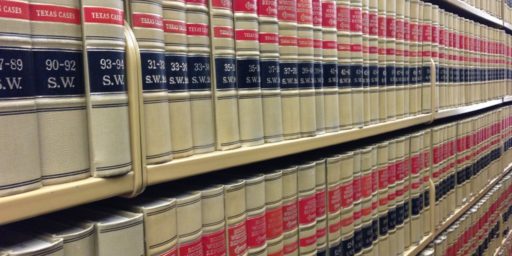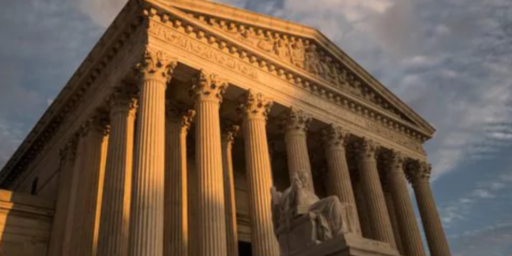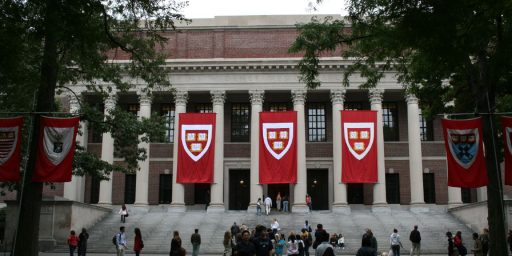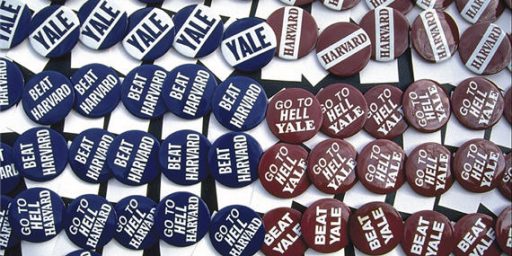Law School Bubble?
For a while now, University of Tennessee law professor Glenn Reynolds has been warning of a higher education bubble, arguing that the skyrocketing cost of tuition may be making college a bad investment. He points to a posting by St. Johns’ Brian Tamanaha for evidence that the same may be true of legal education as well:
[N]on-elite law schools are selling a fraudulent bill of goods. Law schools advertise deceptively high rates of employment and misleading income figures. Many graduates can’t get jobs. Many graduates end up as temp attorneys working for $15 to $20 dollars an hour on two week gigs, with no benefits. The luckier graduates land jobs in government or small firms for maybe $45,000, with limited prospects for improvement. A handful of lottery winners score big firm jobs.
Now, $45,000 coming right out of school doesn’t sound so bad to me. And government jobs have tremendous prospects for improvement, although not compared to the $300,000 salaries paid by some of the biggest firms. But, if your expectation in going to law school is that it’s a guaranteed road to riches, Tamanaha’s caution is right. Then again, it applied when I was an undergraduate seriously considering law school in the mid-1980s.
Glenn’s advice:
With a college degree now functioning, essentially, the way a high-school diploma used to, a law degree is the closest graduate equivalent to the traditional liberal-arts B.A. The biggest problem, though, is the staggering expense. Not all law schools are that expensive, but even state schools are pricey now, and for out-of-staters may cost as much as private schools. If I were looking at law school today I absolutely wouldn’t go into debt except for an absolute top school — like Yale, Stanford, Harvard. And even then I’d be wary. The debt is too enormous, and the prospects too uncertain — not only because of the economy, but because of the uncertain future even of big law firms.
Glenn went to Yale, which is generally considered the most prestigious. At least in academic circles, there’s the Big 6 (Yale, Harvard, Stanford, Columbia, Chicago, and NYU) with Berkeley often thrown into the mix. And there are a handful of other elite schools in a tier just below those, with a “top fourteen” seeming to have emerged after two decades of rankings by US News.
Neither the University of Tennessee nor St. Johns comes close to cracking either list. Indeed, both come well below my graduate alma mater, the University of Alabama (#38). Yet I have friends who went to UT Law (at least one of whom took classes from Glenn) and went on to very nice careers pulling down upper middle class incomes.
If you’re going to consider yourself a failure as a lawyer if you don’t pull down a half million dollar salary or wind up as a federal judge, then you probably shouldn’t go to law school. Certainly, you shouldn’t go if you can’t get in to one of the Big 6, preferably Yale or Harvard. And, yes, you should avoid serious debt for all but the most prestigious schools. If you can’t get significant scholarship money, you’re likely not going to excel in that school, anyway.
Indeed, I’d offer essentially the same advice to those thinking about pursuing a PhD and an academic career. If you’re content to live the “life of the mind” in whatever form it may come, any decent school where you can get funded will work. But if you’re only going to be satisfied with a tenure track job at an elite institution, or even at a PhD-granting institution, then only go if you can get into one of the top ten schools in your discipline and even then only if you’re funded through an assistantship, fellowship, or equivalent. It just doesn’t make sense to go into debt, let alone deep debt, for a job that starts out around $50,000 a year and is hard to come by.
Update (Doug Mataconis): As someone who’s actually been through the law school-to-legal career grind for the past two decades, this article certainly hits home and it points out what I’ve always thought was one of the biggest flaws of legal education — many law schools don’t really do that great a job of preparing law students to be lawyers. For students who end up working for big, or even medium-sized, firms this hardly matters because young associates end up getting paired with partners and spending much of their first few years of practice learning how to practice law by watching others do it. For those of us who didn’t go into BigLaw, though, it’s very much an out-of-the-frying-pan-into-the-fire sensation when you get dumped into a courtroom on your first day of working for a sole practitioner not exactly sure what the heck it is you’re supposed to do. Legal education has improved in this regard somewhat — legal clinics that allow students to work on actual cases with attorney supervision are far more common than they were 20 years ago, for example — but to a large extent students still aren’t getting their money’s worth out of law school. Someday, they’re going to figure that out.







This isn’t a new phenomenon. The differences in pay among lawyers have always been high. The subject of the graduation address given to the law school graduates in my dad’s graduating class 75 years ago was that the best way for a lawyer to become wealthy was to marry a rich girl.
The problem with so many people going to law school is that what else is someone going to do with their degree in political science or American studies?
Law school and medical school are always mentioned as two routes to success but the old joke goes that you call the guy who graduated last in class at law school, Dr., just like everyone else. Also, CMS reinburses all physicians the same, so going to Texas Tech law school is not a bad deal versus Harvard Medical School.
As long as people are willing to pay more for better attorneys and attorneys from the top 14 are considered the only good lawyers, then people should be careful in attending law school.